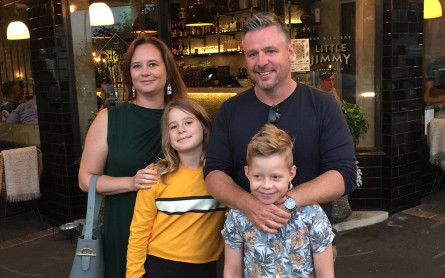
9 May 2022
Reading time: 5 minutes
Posted by Sorted,
0 comments

My Money Sorted is our series exploring people’s experiences and views about money on their journey to living sorted. We spoke with Jessamy, who works as an external communications manager at the Financial Markets Authority (FMA). Jess lives with her husband Tony and children Matilda and Henry in Te Atatu. Working in the financial sector, Jess has learned a lot about money and behaviour that she may not have otherwise – and is putting her knowledge to good use.
I think it’s that old Dickens quote: 'Annual income 20 pounds, annual expenditure 19 [pounds] 19 [shillings] and six [pence], result happiness. Annual income 20 pounds, annual expenditure 20 pounds ought and six, result misery.' Which basically means, spend less than you bring in, and you’ll be happy. Spend more, and you’ll be miserable. I like this quote for three reasons. One, it speaks to being intentional with money. Two, it warns of debt. And three, it links how we manage our money to our overall wellbeing.
I would say I am a reformed spender. Lately I have been thinking about how money spent relates to happiness gained, so I can spend more on what brings me the most happiness. This allows me to reduce spending on everything else, with the goal of increasing the gap between my income and expenses so I can save and invest more.
Interestingly, the things that bring me the most happiness – like going for a long walk with a podcast and a coffee, reading a great book, visiting my whānau or watching my son play cricket on a Saturday morning – cost very little.
My first experience of investing was with KiwiSaver, and then I started DIY investing with Sharesies – picking and choosing my own investments. I did that for a year or so, before realising it was a lot simpler to just leave it to the experts, so I opened a managed fund and we make regular contributions from our wages. We’re not planning on spending that money for at least ten years or more, so we’re comfortable with a higher risk fund.
I think getting rid of my credit card permanently a few years ago was a turning point for me. I read The Barefoot Investor and realised even that, even though I paid it off every month, it still wasn’t worth it because of the annual account fee.
I switched to a Visa debit card, which has been just as convenient, if not more so because I’m spending my own money, not the bank’s. People say: what about the reward points? Scott Pape has a good argument for this in the book.
I think it’s keeping track of things and feeling like I’m making progress. I enjoy reading personal finance books and following money bloggers – I find this quite motivating. I follow a bunch of social accounts like Rachel Cruz, Money with Jess, the Broke Generation and Frances Cook. I recently read Frances Cook’s new book Your Money, Your Future, which was excellent; her first book is great too.
I’m one of four kids, and we didn’t have a lot of money growing up, so my parents were very frugal. Mum is the best bargain hunter, and she was so creative.
I inherited her love of op-shopping. It’s frugal, it’s more sustainable, and you’re usually supporting a worthy charity like Hospice or the Sallies.
I think simple things, like being able to cook well, sew a button, craft and create special experiences for kids without spending a lot are things I got from my mum.
My Dad taught us about budgeting, saving and investing. Still to this day he writes all their household expenditure into categories in one of those old school maths books. Dad is a huge advocate of KiwiSaver, and all four of us have KiwiSaver at his insistence. Two of my brothers used their KiwiSaver to get into their first homes.
Keep going! You can do it!
Certainly buying and owning a house in Auckland is something I am grateful for every day. But it’s been more of a series of moments over time, which has resulted in a mindset shift towards being more content. I’m more confident now, recognising society’s ongoing focus on consumption and being able to step out of that.
Perhaps the proudest money moments in my life have actually been those of gratitude – seeing that actually we have (and are) enough.
I love to cook, and I finally got a proper, decent, expensive kitchen knife. It has greatly improved the cooking experience, and so far I haven’t managed to cut myself, which is a win.
If you asked me this a few years ago, I think I would have felt more uncertain! But recently I made some important changes to my KiwiSaver, which made me feel more comfortable.
The first thing I did was change my provider from a big bank to an investment firm. Then, I adjusted my risk profile. Because I’m 40 with 25 years to go, I felt comfortable taking on more risk.
Then I increased my contributions. This has already made a huge difference to my balance. I’ve done the sums on Sorted’s KiwiSaver calculator, and I feel okay with where I’m at now.
Use verification code from your authenticator app. How to use authenticator apps.
Don't have an account? Sign up
Or log in with our social media platforms


A free account gives you your very own space where you can save your tools and track your progress as you get ahead.
Or sign up using Google:


Comments (0)
Comments
No one has commented on this page yet.
RSS feed for comments on this page | RSS feed for all comments